Istanbul to Ankara
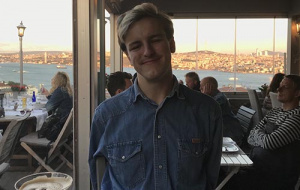 Roger Short Memorial Fund Travel Report – Miles Hession
Roger Short Memorial Fund Travel Report – Miles Hession
This trip was all made possible by the Roger Short Memorial Fund, and to the fund and its generous contributors I am eternally grateful for such a life-changing experience. I would like to additionally thank Victoria Short for her hospitality in Istanbul, and her commitment to help throughout the trip.
From the generosity of the fund and its contributors, I was able to travel from Istanbul to Ankara, and I added privately-funded trips to Beirut, Tel Aviv, and Jerusalem. The focus of my travels was to meet with LGBTQ+ activists in the region, to see their varied approaches to activism, and to see the different responses from governments and people. What follows is a day-to-day account of my travels throughout all the cities I visited, as well as my final thoughts on the experience as a whole.
19 September
Following a net total of 24 hours spent in planes, airports, and cars, I arrived in Istanbul. My eyelids were heavy and I felt fatigued, but driving through the city completely reinvigorated me. Well, that and being yelled at because I called an Uber and Ubers are apparently quite “illegal” at the airport. As I got in a proper taxi, I was greeted with a Coke and a cigarette: Turkish hospitality. My driver helped me practice my crude Turkish as we navigated the anarchy of the Turkish highways. I savored the potential that lay within these first few moments in a city unknown, looking around at the completely unfamiliar. I saw houses dot the mountain sides surrounding the city, layered on top of each other like a tiered cake. I saw men relaxing with their feet up as they drove at a cruising speed of 80 miles per hour. I saw a city that I would certainly never know fully, but one that I could only hope to know a sliver of by the time I had to leave.
I held off on searching for that sliver that night though, as I arrived at my hostel at 21:30 and desperately needed to sleep. My main priorities were: make some more concrete day-plans for tomorrow, get some rest, and clean up the face wash that had exploded in my suitcase.
20 September
It was a wet, gloomy day in Istanbul. My first wake up – which far preceded my iPhone alarm – was to the sound of the morning prayer, Fajr. I awoke in a confused stupor to a loud booming voice reciting a prayer in Arabic. I frantically looked around at my room in the hostel and wondered where on Earth I was, checked my phone to confirm, Istanbul, and then quickly dozed off again.
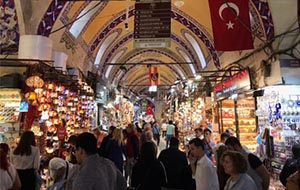 About 3 hours later I was up again, this time for good. I changed from my pajamas/airplane clothes into something clean and free of the scent of travel. After scarfing down my breakfast – an assortment of cheese, vegetables, bread, fruit, and two delicious coffees – I was off on my way. I emerged from my hostel, a small and unassuming building near Galata tower, to see Istanbul in the daylight for the first time. Navigating down a hill, I arrived at the tram stop and coerced the automatic ticket machine into letting me ride. I stepped on the tram and headed towards my first destination of the day, the Grand Bazaar.
About 3 hours later I was up again, this time for good. I changed from my pajamas/airplane clothes into something clean and free of the scent of travel. After scarfing down my breakfast – an assortment of cheese, vegetables, bread, fruit, and two delicious coffees – I was off on my way. I emerged from my hostel, a small and unassuming building near Galata tower, to see Istanbul in the daylight for the first time. Navigating down a hill, I arrived at the tram stop and coerced the automatic ticket machine into letting me ride. I stepped on the tram and headed towards my first destination of the day, the Grand Bazaar.
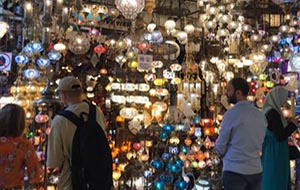 I’m a sucker for large markets like this, mostly because I love the variety of goods sold. You have those merchants peddling Zultanite and Meerschaum (native Turkish minerals), scarves and hookahs, lanterns and rugs, appealing to those who want something that only Turkey can offer. In contrast, you have other merchants that are selling “luxury,” “designer” brands, without the hassle of the high price or quality of luxury designer goods. Questionably “Prada” and “Fendi” jackets and shirts hang next to walls of Turkish rugs. Bright amber Zultanite change color when the electroplated “Gucci” belts bounce light off them just right. But the reason that I always come back to these sorts of markets is the pockets of authenticity they’re always sure to harbor.
I’m a sucker for large markets like this, mostly because I love the variety of goods sold. You have those merchants peddling Zultanite and Meerschaum (native Turkish minerals), scarves and hookahs, lanterns and rugs, appealing to those who want something that only Turkey can offer. In contrast, you have other merchants that are selling “luxury,” “designer” brands, without the hassle of the high price or quality of luxury designer goods. Questionably “Prada” and “Fendi” jackets and shirts hang next to walls of Turkish rugs. Bright amber Zultanite change color when the electroplated “Gucci” belts bounce light off them just right. But the reason that I always come back to these sorts of markets is the pockets of authenticity they’re always sure to harbor.
Hidden away in a corner of the market was a man selling pipes made of Meerschaum, a mineral only found in Turkey. When I entered I was skeptical, as I had seen many similar products with varying price points and varying signs of quality, but he explained to me how his goods were different. He showed me the tools he was using to carve the Meerschaum, and showed me a few that were works in progress, for all of his goods were handmade by him. He told me all about carving Meerschaum, how this art form has existed for hundreds of years, and how it remains alive today. He represented a continuation of its history of art and commerce, and I was fascinated. Of course, it could have all been an elaborate lie used to swindle tourists into purchasing mass-produced pipes, but I chose to believe him (and to avert my eyes from very similar looking pipes at other stalls), leaving the Grand Bazaar a happy customer.
After some lunch I headed back towards my hostel, as I had a meeting at 5 in Taksim Square. I contemplated my plan to go on a run while here, as I quickly became out of breath climbing the eternal stairs towards my destination. The rain began to pick up with each step, and I decided I needed to dry off and fight my sleep deprivation with a coffee. I found a cafe and was greeted by a hiss from the millionth stray cat in Istanbul, a good omen I decided – locals trying to protect their spots. I entered and was greeted with old cafe smells: rich wood, coffee beans, aged paper. I had my third Turkish coffee of the day and prepared for my interview.
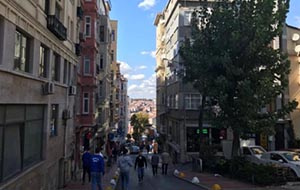 I met with Mustafa Sarıyılmaz, a tall, thin man who is the General Coordinator at an organization called Social Policy, Gender Identity, and Sexual Orientation Studies Association, or SPoD for short. I got a chance to visit their offices and see inside. It was a retrofitted apartment, in a quiet part of the city, with no visible signs out front. I discovered that this was their 4th office location in the past year and a half. They had moved twice due to physical attacks and twice out of fear of future physical attacks.
I met with Mustafa Sarıyılmaz, a tall, thin man who is the General Coordinator at an organization called Social Policy, Gender Identity, and Sexual Orientation Studies Association, or SPoD for short. I got a chance to visit their offices and see inside. It was a retrofitted apartment, in a quiet part of the city, with no visible signs out front. I discovered that this was their 4th office location in the past year and a half. They had moved twice due to physical attacks and twice out of fear of future physical attacks.
Throughout our conversation, we discussed how he personally became involved with the organization––first as a volunteer, then moving up to a paid position––and how their volunteers are most, if not all, LGBTQ+ themselves, bringing unparalleled passion. The volunteers at the organization do a variety of things, including working in a hotline meant to help those struggling in Turkey, providing legal assistance in court cases and education about the legality of emancipation, running training workshops to introduce LGBTQ+ friendly terminology to work professionals, and providing a space that cultivates a sense of community. Mustafa proudly told me that they were the most effective Turkish organization due to the variety of resources that they offer and their uncompromising attitudes towards unity.
We discussed the current state of LGBTQ+ rights within Turkey, and I asked Mustafa how he remained motivated in spite of hardships. Despite many people he’s known having left the country in the past year and a half, and with the government crackdowns banning events like Istanbul Pride and Queer Olympix, he looks towards the optimistic undercurrents within the country. With the Turkish government becoming more repressive in recent years, communication between LGBTQ+ organizations within Turkey is stronger than ever, each keeping the others up to date with all information and updates that occur. They hold a yearly meeting with one another to discuss the current state of affairs and are more galvanized to change. Outreach to LGBTQ+ people from SPoD remains high even with threats to their organization. He told me, “We have to have hope. Without hope we would not be here.”
One interesting discussion that we had was when some Western, American/European, activist groups were brought up. When I asked about coordination and works with these Western groups, Mustafa said that Western LGBTQ+ groups and human rights groups will often issue publications and decrees condemning Turkish LGBTQ+ policy, which he says they are right to do in theory; however, they lack any sort of outreach to domestic groups, and oftentimes the wording and language they use is so forceful and so critical that it causes a lot of backlash. The subject of the backlash, though, is not usually the international human rights group, but is actually the domestic group who try so hard to carefully navigate Turkish cultural norms. This frustration is compounded by the fact that the stigmatization of LGBTQ+ individuals can often be traced back to previous Western influences.
Our interview concluded with him inviting me to a LGBTQ+ award show the next night that recognizes non-celebrity activists for their work throughout Turkey. These types of events are only possible because they are hidden from the public eye, whereas more visible events have been routinely canceled for the past 5 years. I am so blown away by the bravery of these activists. They fully admit that volunteering or working for these organizations greatly increases their visibility which therefore increases their danger and ostracization, but they do it anyway. It’s incredibly admirable and has me wondering what I would do in that situation: would I stay in a country that actively oppresses me, or would I leave all I’ve known for something else?
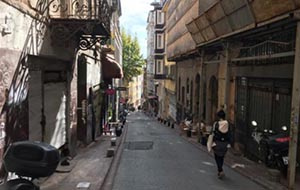 21 September
21 September
Google Maps will lead you down some very secluded alleys if you let it. 45 minutes of travel, followed by an additional 15 as I had gotten off at the wrong bus stop, led me finally to my destination. Located in the northernmost part of Beyoğlu was the cafe I had been hoping to go to. This spot interested me not because of any particularly good Turkish coffee, but because of its importance as a meeting spot of an organization that I had reached out to several times, but heard nothing from, called LISTAG (for families of LGBTQ+ people within Turkey).
Arriving in this part of the city, far from any museums or tourist traps, felt immersive and new. I was the only Western tourist in this area that I could see, and as such received quite a few stares. Nothing malicious, or protective, but more confused why someone like me would be in that area. I was on a mission though, to get to this cafe for the weekly meeting of LISTAG families.
When Google Maps declared that I was there, I looked around in confusion. Not a single sign indicated the cafe listed on their website, and I was spinning around in confused helpless circles on the lookout for it. Eventually, I saw a sign that indicated a cafe would be located upstairs, and I fruitlessly asked a few people nearby if they knew where it was. Most shrugged and continued on their way, so with this sign as my only indication I stepped into the apartment building to try and find it.
After the first landing of stairs, the rest of the lights were out. Littering the floor were beer cans, ashtrays, and cigarette butts, the poor ashtrays failing at their single purpose. I heard voices, but they were coming from inside residential apartments, with family names on the buzzer. I now had to pull out my phone flashlight and continue my climb.
Up the final flight of stairs there was a door slightly ajar. I peeked inside, thinking about how silly I would feel being so nervous about all of this if there was the cafe inside. When I pushed open the door, though, there were no coffee beans, or rich old wood, or aged papers, but instead a ransacked place with no semblance of recent activity. Dirty linoleum tiles were peeling off the floor, the blinds stood defiant to the light trying to peer in, and pieces of linen and fabric laid everywhere.
I turned around quickly and flew down the stairs. I emerged from the apartment building right as Dhuhr, the evening prayer, had begun. As the voice of the Imam boomed over megaphones, I hung my head in thought. What had happened to this place? Were they forced to move too? How many others are forced out of places that they’ve made a home because of the police or extremists?
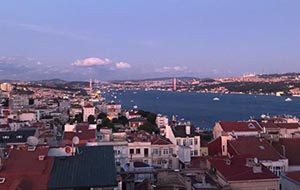 Finding myself with no goal in this area, and no plan besides quiet contemplation, I headed towards the Istanbul Museum of Modern Art, located a little way north of Galata Tower. I was enthralled with a few views of the city, the type of view that you could sit and stare at for hours and when you turn around to finally leave, you still get the urge to turn for one last look. The colors were vivid, like in an old postcard come to life. The orange tile rooftops and bright white buildings were sandwiched between the blue of the Bosporus Strait and the clear sky.
Finding myself with no goal in this area, and no plan besides quiet contemplation, I headed towards the Istanbul Museum of Modern Art, located a little way north of Galata Tower. I was enthralled with a few views of the city, the type of view that you could sit and stare at for hours and when you turn around to finally leave, you still get the urge to turn for one last look. The colors were vivid, like in an old postcard come to life. The orange tile rooftops and bright white buildings were sandwiched between the blue of the Bosporus Strait and the clear sky.
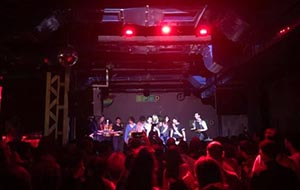 At night, I headed to the LGBTQ+ award show hosted by SPoD. After a short walk, I turned down an alley and immediately knew I had arrived at the event. Lining the sides of the street was queer culture up and down. The fashion was gender-bending, colorful, and non-conforming. Bright fabrics of every color was the prevailing theme of choice, donned by both ladies, men, and non-binary friends. Androgyny, with short hair and loose-fitting clothes, was as common as gender exaggeration, high wigs and eccentric makeup or sharp suits with clean lines. A red carpet had been laid out, and activists who were being honored walked down it to a chorus of cheers. Their voices were being praised and sang back to them as they walked the red carpet like a runway, and everything was set for an exciting celebration.
At night, I headed to the LGBTQ+ award show hosted by SPoD. After a short walk, I turned down an alley and immediately knew I had arrived at the event. Lining the sides of the street was queer culture up and down. The fashion was gender-bending, colorful, and non-conforming. Bright fabrics of every color was the prevailing theme of choice, donned by both ladies, men, and non-binary friends. Androgyny, with short hair and loose-fitting clothes, was as common as gender exaggeration, high wigs and eccentric makeup or sharp suits with clean lines. A red carpet had been laid out, and activists who were being honored walked down it to a chorus of cheers. Their voices were being praised and sang back to them as they walked the red carpet like a runway, and everything was set for an exciting celebration.
Indoors, rainbows and twinkly lights dominated the otherwise inconspicuous bar. There were stalls giving away SPoD branded garb: rainbow pins, tote bags, and stickers. There was free wine being served, and people began filing in to fill the space with generosity, warmth, and color. All at once, the ceremony kicked off with speakers coming to the stage announcing awards to booming applause. While most of the speeches were in Turkish, and I did not understand them, one man gave a speech representing the Friedrich Naumann Foundation and spoke in English about the importance of polite pressure for tolerance. He spoke of Syrian refugees becoming resettled throughout Germany, and how one of the largest shocks for them was the acceptance of LGBTQ+ people within the country. He said that while it is important to respect the background and culture of a person, respect cannot lead to intolerance and inequality, and pressure towards acceptance must be maintained.
Later on in the ceremony, Mustafa came on stage and gave a speech. It was so striking seeing him in this context and was such a contrast from our previous interview. He seemed more at ease here, even on stage in front of hundreds of people, and looked as if he could breathe easier. This is the importance of these communities having time for celebration and fun along with their more professional activism work. Mustafa, and many of the other activists here, could lean into the celebration of their culture, and not have to worry about backlash. Everyone was breathing easier.
22 September
With the positivity and celebration from the previous night following me the next day, I set off to do some more touristy activities. I hopped on the tram and headed towards Sultanahmet, taking care to appreciate the view of crossing the strait from Beyoğlu.
Arriving in Sultanahmet, I made my way to the Blue Mosque. From reading other travel diaries and speaking to other visitors, I knew to keep my expectations low: perpetual construction obstructs much of the view. I walked into the courtyard, removed my shoes, and entered the mosque itself. I must say, unfortunately the other travel diaries had been right.
I imagined that the mosque must have been quite beautiful and could maybe appreciate the tile work and complexity of the architecture, but the sea of tourists and the scaffolding which covered the walls made it almost impossible to appreciate the building itself. The intricate blue tile designs were drowned out by construction lights. The main drawback of open access to places like these is often the access that it gives. As quickly as I was in, I was out, my shoes were thrown on, and I was on my way.
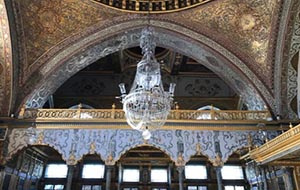 I then headed towards Topkapı Palace, where I once again encountered a sea of tourists. Probably not the smartest place to go if I was looking to avoid the tourist scene I had already seen, but I persisted. Entering the palace and looking around was stunning, as I imagined for a minute the millions of others who have taken the steps I had through the main gate. How many of the most powerful people in history had seen what I was seeing? I also found it quite shocking to think that for only about the equivalent of 10 USD I was able to go inside a compound that most people in the times of the Ottoman’s would never get a chance to.
I then headed towards Topkapı Palace, where I once again encountered a sea of tourists. Probably not the smartest place to go if I was looking to avoid the tourist scene I had already seen, but I persisted. Entering the palace and looking around was stunning, as I imagined for a minute the millions of others who have taken the steps I had through the main gate. How many of the most powerful people in history had seen what I was seeing? I also found it quite shocking to think that for only about the equivalent of 10 USD I was able to go inside a compound that most people in the times of the Ottoman’s would never get a chance to.
I roamed the gardens and made my way towards the building that housed the religious relics. Once inside, I felt extremely claustrophobic as the large crowds shuffled forward slowly in a single path. I saw the staff of Moses, cooking pot of Abraham, and the footprint, beard hair, and tooth of Muhammed. Throughout my viewing of these artifacts, I felt a sense of guilt growing. I grew up very nonreligious, so these artifacts I saw had little meaning to me beyond what I have heard about them. I felt it almost disrespectful to be viewing them, as if I was taking the spot of someone who would appreciate them more. I decided, though, that I could respect them for the importance that they have on others’ lives and felt it important to be attentive and examine them. That way, I could also honor and respect those around me who did have a deep sense of connection to these objects.
After leaving the room with this sentiment, I thought that the best way I could honor and respect those around me was to find some place a bit more secluded. If I was hit by another selfie stick, I wasn’t sure how much respect I could reciprocate. I walked back to the main courtyard and then saw the entrance to the Harem, which cost an additional fee to enter. At first this deterred me, but then I realized that it must have deterred many others, so I coughed up the 7.50 USD and entered into this new section of the palace.
Inside I found quiet and seclusion, true immersion into an Ottoman life. The halls were bare of furniture, but the walls were beautiful. The chambers of the Harem itself and the bedrooms were magnificent. The grandiose atmosphere enchanted. Shiny gold was the color of choice splattering the ceiling with intricate murals and eye catching colors. As I moved through room by room, I noticed that as new people emerged from each room almost immediately their reflex was to grab their phone or camera and snap some photos. Not to become one of those characters grumbling about people using their phone too much but it was striking when I realized that I had begun to do it too. Something about the collective energy, that these spaces were so beautiful that they needed to be documented, as if they hadn’t been before.
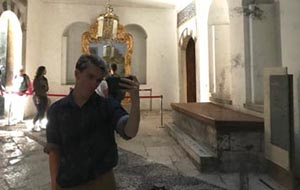 There was certainly an element of vanity involved too, as a line wrapped out of one room for visitors to take a selfie in front of one of the mirrors in a bedroom and others would shoo people away to get them out of their shot. The worst part? I took one of these selfies. I queued up, waiting for my turn, glared at some people in the background, and posed like I had just stumbled completely on accident into this photo-op. Just my luck Instagram! Look at this goofy selfie I got in this amazing palace.
There was certainly an element of vanity involved too, as a line wrapped out of one room for visitors to take a selfie in front of one of the mirrors in a bedroom and others would shoo people away to get them out of their shot. The worst part? I took one of these selfies. I queued up, waiting for my turn, glared at some people in the background, and posed like I had just stumbled completely on accident into this photo-op. Just my luck Instagram! Look at this goofy selfie I got in this amazing palace.
After shuddering at my own behavior, I made a vow to just enjoy the rest of my time in the palace. I took an awful long time just staring out at the view in the courtyard of the apartments of the concubines. The courtyard had a beautiful, quiet, view of the city and Galata tower. There I sat on some stairs, where centuries ago a mother of a future sultan must have sat as well, and stared at the beauty of the Istanbul skyline, taking in for a moment (about half an hour) how lucky I am to be seeing this with my own two eyes.
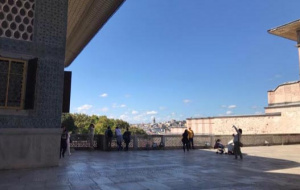 Leaving the palace, I stopped for a coffee just outside Sultanahmet. I look forward to these little stops, as I’ve grown to now crave Turkish coffee and Turkish sweets. Initially I was skeptical of the place, as I was afraid it would be full of the tourists I had just left at the palace. To my surprise, despite being a few minutes away from the main tourist area, it was a secluded little courtyard with tall strong palm trees, a quiet swirling pond, and with few patrons lazily enjoying their Sunday afternoon. I stopped to journal and listen to my surroundings, and gleefully imagined myself living in this city, finding my favorite coffee shops, and staying for hours in a private paradise as the city melts away beyond the walls.
Leaving the palace, I stopped for a coffee just outside Sultanahmet. I look forward to these little stops, as I’ve grown to now crave Turkish coffee and Turkish sweets. Initially I was skeptical of the place, as I was afraid it would be full of the tourists I had just left at the palace. To my surprise, despite being a few minutes away from the main tourist area, it was a secluded little courtyard with tall strong palm trees, a quiet swirling pond, and with few patrons lazily enjoying their Sunday afternoon. I stopped to journal and listen to my surroundings, and gleefully imagined myself living in this city, finding my favorite coffee shops, and staying for hours in a private paradise as the city melts away beyond the walls.
Breaking from my Turkish daydream, I made my way towards Galata tower where I met with Victoria Short. She pointed out a street that once ran through the city which is no longer there, the small workman shop that is now a bustling cafe, and the neighborhood that, when she moved in, was far from as trendy as it is now. We had drinks on the rooftop of her apartment building, and she told me all about how Istanbul and the nation has changed since she had first begun visiting/living in the country.
What she had told me mixed with my notions of the back and forth between the same political powers for decades, Erdogan’s rise to power and then subsequent consolidation of power, and the failed military coup. I kept looking out towards the skyline and seeing a city on the brink of something more. With the recent local elections and the mayoral elections in Istanbul being a direct affront to Erdogan paired with all the activists I’d spoken to and the strengthened unity they’ve shown, I couldn’t help but feel some optimism that change could be brewing.
23 September
My last full day in Istanbul started with a skype interview I had with Nour from the Arab Foundation for Freedoms and Equality (AFE). Over the interview, I learned about AFE’s role as a region-wide leader for the Middle East and North Africa (MENA), as they act as a coordinator of information and knowledge throughout many of the countries that they serve in. As a regional leader, they often communicate with western advocacy groups like the Human Rights Watch and Amnesty International and do studies and research directly with them. I thought it was interesting how much of a middle ground they act as between the two spheres, and they had a reputation of international outreach I had not seen in many other groups.
AFE’s approach is very much focused on education and empowering local activists with the tools to ensure protection of LGBTQ+s in the region. It is less focused on increasing visibility. This was explained to me as an obvious approach for the countries within the MENA, as increased visibility could mean violence or ostracization, whereas giving local activists greater tools to build communities and provide vital healthcare creates stronger, safer, LGBTQ+ environments. Their goals were to ensure safety first, and while they do not oppose any sort of demonstration or visibility by other groups in MENA, they prioritize other activism first.
Once our call had concluded, I went to finally see the Hagia Sophia. After only seeing the outside of it for the first part of my trip, I was extremely eager to see what was promised to be a magnificent interior. I was not disappointed. Upon entering, I was immediately awestruck by its size: the high arching ceilings, large dome, the fact that it took not just one massive chandelier to light the whole thing, but about a dozen. Not only had humans built this structure, but they had also maintained it for centuries––reinforcing and rebuilding, restoring and repairing. It was a testament not only to human ingenuity but also human endurance.
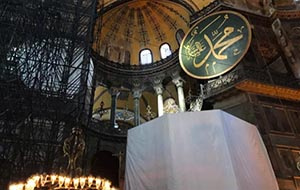 I found it striking that a lot of the beauty that I saw in Hagia Sophia was from its signs of antiquity. With fading paint, half-lost mosaics of Christ and blurred tile work, it was so beautiful because it was so old. It reminded me of the Turkish rugs that lined the streets of Istanbul for sale, with many of them looking pre-faded and used. They were beautiful because they’ve been around for a long time and will continue to be around. The value comes in its quality, and I admired so much of the Hagia Sophia because I thought of not only how many people have already seen it, but also how many would see it.
I found it striking that a lot of the beauty that I saw in Hagia Sophia was from its signs of antiquity. With fading paint, half-lost mosaics of Christ and blurred tile work, it was so beautiful because it was so old. It reminded me of the Turkish rugs that lined the streets of Istanbul for sale, with many of them looking pre-faded and used. They were beautiful because they’ve been around for a long time and will continue to be around. The value comes in its quality, and I admired so much of the Hagia Sophia because I thought of not only how many people have already seen it, but also how many would see it.
A hop skip and an under-the-lake train ride later, and I was in the Kadıköy neighborhood, recommended to me by Victoria. A quick dinner of some concoction of broth-soaked bread, meatballs, red sauce, and a bean salad was followed by a coffee shop and then a stroll along the water. I looked out once again at the endless skyline while boarding my ferry back to my hostel, tried my hardest to appreciate it, and returned to my room to sleep.
24 September
It was a late start this morning, which was regrettable as I was hoping to get a run in while I was in Istanbul. Alas, it would have to wait for another time. I packed up my belongings, got one last look at my room, and headed along my way. Leaving the city, a wave of sadness washed over me. Although I had made an effort to experience much of the city, I felt like there was still so much more to see and do. I hope to be back soon. I need to see more of that massive, beautiful, and charmed city.
I hopped on a coach, heading to Ankara and enjoyed the luxury of the experience. The coach had reclinable chairs, large windows, and made frequent stops along the way to get snacks from various rest stops. At one in particular, I guess the way I was carrying myself was quite Turkish, as multiple other tourists came up to me attempting to pay for their various snacks and waters. Each time I would look up from my own shopping and shake my head and they would let out a frustrated groan. I couldn’t help but feel I had let them down.
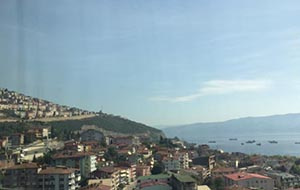 The scenery was fantastically repetitive. It was as though we had turned the corner around some mountain to emerge on some magnificent bridge over some pristine blue water with a picturesque hillside town across the way about five times now. We don’t have many mountains in Illinois, and even fewer picturesque hillside towns, so each one is a treat that I find difficult to peel my eyes from.
The scenery was fantastically repetitive. It was as though we had turned the corner around some mountain to emerge on some magnificent bridge over some pristine blue water with a picturesque hillside town across the way about five times now. We don’t have many mountains in Illinois, and even fewer picturesque hillside towns, so each one is a treat that I find difficult to peel my eyes from.
Arriving into Ankara, I navigated my way through the subway and arrived at my hostel. It was a cheery place, with bright large couches, chairs, and walls in primary colors, but despite the energy of the place, I quickly found my way into the bed. A new city, a new sliver to explore.
25 September
The day began with a walk through the streets of Ankara. I was extremely interested in one book market that I stumbled upon. Lining an unassuming street in Ankara, covered with plastic wrap due to a light drizzle, were hundreds of books all about learning English and other languages. People eagerly handed over their hard-earned Liras in exchanged for these Rosetta stones. I imagined that they were planning on going places, wanted to find a better job that requires multiple languages, or were merely looking to pick up a new skill. A street full of people looking to better themselves. A beautiful sight.
Later that day, I met with a worker at the organization Pembe Hayat, or Pink Life. For their anonymity they asked me to refrain from using their name, so I will refer to them as Alex (as they are gender non-binary). They were the director of one of Pembe Hayat’s main yearly event, Queer Fest, a multiday festival celebrating Queer life in Ankara. There has not been a Queer Fest for a couple of years now due to Ankara’s governor and a ban on LGBTQ+ events. The governor decreed that these events would not take place due to their risk of hurting “public morality,” and despite the official ban being overturned, the governor still has the discretion to cancel events whenever, citing security and safety reasons. Many events in Ankara now lie in purgatory, where they do not know if they will be canceled or not.
Alex also told me about some of the more troubling news I had not heard that came out of Ankara. Recently, the local government tried to have the local LGBTQ+ advocacy groups, including Pembe Hayat, labeled as terrorist organizations. The government’s claim was that these groups were funded by the West, like the USA, as a form of cultural imperialism. Throughout our conversation, Alex would laugh at some of the actions of the government, as if they were still in disbelief that they were real, I too was in disbelief.
Following our interview, I went to meet another worker named Damla, the International Relations/Human Rights Program assistant director for KAOS GL. Initially a LGBTQ+ publication, KAOS GL expanded to broader activism and advocacy throughout the years, consistently increasing the tools and outreach in their arsenal. We sat at a coffee shop by their office, as there were concerns about me entering their actual office space and learning of its whereabouts. These concerns were not unfounded of course, as they had just recently moved offices due to an IS threat specifically raised against them.
Damla was a tall, well-dressed, 20-something. We discussed an upcoming event that they were hosting in Izmir, a nearby city, because of the ban in Ankara. This was a big point of interest in our conversation, the nature of Ankara activism. Without any ability to hold consistent and safe events, many organizations choose to either host them underground or not host them at all. KAOS GL rather focuses their work on more institutional activism, like publishing academic papers, holding training workshops, and providing legal support. These activities are easier to get support from the government, and easier to get recognized as an official NGO, but they lack the sort of celebration and fun that purely communal events have. Damla mentioned the award ceremony I had gone to in Istanbul and said events like that encourage and support other activists to continue their work through fun and shared recognition.
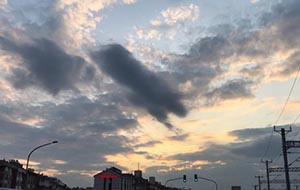 She was optimistic though, about a lot of things to come. As she finishes up her thesis she has also been doing work cautiously looking towards reaching out to the new mayor of Ankara, who has said he would strive towards some LGBTQ+ equality measures. She considered leaving Turkey, using the popular route of working towards higher education to then establish roots in new countries, but now is firm in staying and has plenty of work to do here. Once again, invigorated by the bravery of Damla and Alex, I continued the rest of my day contemplative but optimistic about the movement.
She was optimistic though, about a lot of things to come. As she finishes up her thesis she has also been doing work cautiously looking towards reaching out to the new mayor of Ankara, who has said he would strive towards some LGBTQ+ equality measures. She considered leaving Turkey, using the popular route of working towards higher education to then establish roots in new countries, but now is firm in staying and has plenty of work to do here. Once again, invigorated by the bravery of Damla and Alex, I continued the rest of my day contemplative but optimistic about the movement.
26 September
The day consisted of train rides and transit. My train from Ankara back to Istanbul took 4.5 hours, and despite being fatigued from traveling, I really could not complain with the scenery around me. There are certainly worse places to travel through. I quickly googled flight prices and texted practically everyone in my phone “Hey do you want to go to Turkey sometime?.” This would not be my last time here, and I realized this might be the most beautiful place I’ve ever seen.
My taxi ride to the airport was a somber occasion. I kept looking out the window behind me at the fading, dimming skyline, as my departure was perfectly timed with the sunset. The oranges, yellows, and pinks lit up the clouds as if to say goodbye. The waters were calmed, the lights began to twinkle, I waved goodbye. Turkish hospitality.
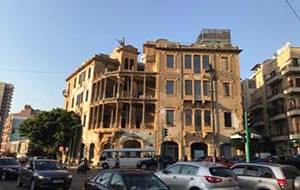 27 September
27 September
I landed in Beirut in the early hours of the morning and made my way over to my hostel in the central part of the city, in a neighborhood called Hamra. In my taxi ride over, I rolled down my window and was choked by smog and pollution, and rolled it back up quickly. A new city, this one smaller and much different. Hamra’s streets were packed densely but stoutly. Not many buildings rose high, a practicality, perhaps, after years of wars.
After sleeping, I set off on the path for a tourist sim card so I wouldn’t end up lost in this new city. I roamed the city streets and was struck by the combination of new construction and the old. The old buildings were worn, aged, but were distinct in their style. Tall columns held up the decaying buildings, with complex archways and balconies, earthy brown walls, and elaborate window framings. These buildings were common, but not the norm, as they were usually sandwiched between modern white square apartments. These were simple and looked almost as if they were built with hesitation, the white walls with paint peeling off them from uncertainty, wondering how long they would stand.
The hot sun woke me from my over-analyzation, and I stumbled into a sim card shop. Now, with cellular data in hand, I was equipped to fully explore the city without getting fully lost. After stopping for lunch at a cafe, I tried coffee with cardamom in it and discovered that I do not like coffee with cardamom in it. With this new information in tow, I left the center of the city to go south to have my meeting with Pia at MOSAIC.
Pia was a young woman, with tattoos, short black hair, and a very candid way of speaking about her and her organizations’ work. MOSAIC was created following a clear need in Beirut and Lebanon at large for mental health services of LGBTQ+ individuals. Without support for those dealing with isolation from their family and friends, many were struggling and struggling in silence, so MOSAIC stepped in to help these people through their darkest times. They subsequently expanded quite rapidly to other services, including legal services, assisting in gaining legal sex changes, and dealing with the notorious penal code 534.
Penal code 534 is a law in Lebanon that outlaws any “unnatural sexual relations,” but without specificity into what that means, it has been used to persecute against LGBTQ+s in Lebanon for decades. The law is a little vague on where it is applied and how it can be used. While it does dictate that it requires actually seeing the sexual act, authorities may coerce confessions out of those in custody through interrogation or perform forced anal exams to check for sexual activity. Recently, police have illegally searched phones for dating apps like Grindr and have used those apps as proof for a violation of 534. The punishment for violating 534 is a one-year sentence to prison or a heavy fine, and despite some courts’ rulings on some jurisdiction that it cannot be used against LGBTQ+ people, police in many parts of the country continue to do so.
MOSAIC also has a political advocacy wing of their organization, but because the atmosphere of Lebanon and Beirut has recently become much more conservative, they are not even attempting to touch 534, and rather seeking out court cases to better define it. Pia attributed this atmosphere to religious conservative groups collaborating with the government to prevent any changes to any laws. These religious conservative groups have also shut down many LGBTQ+ events taking place in Lebanon by leveraging threats and pressure to put on the government and venue owners. When the LGBTQ+ movement mobilizes so too does this clerical movement, and with the law on their side and spreading of false propaganda, the clerical side is often much more successful.
Leaving the meeting, I spent the afternoon roaming through the dense short streets of Beirut. Throughout my roaming was a constant chirp of taxi horns honking at me, asking if I needed a ride. Despite not holding out my hand or inviting them, they implored that I surely was lost and surely needed a ride to get where I was going. When I declined one, 5 minutes later, I heard another chirp and another invitation. Out of some weird spite, ignoring the fact that I was an hour and 15 minutes from my hostel, I choose to walk home in protest of the honking. The chirping never stopped.
28 September
Feet hitting the pavement, lungs struggling to keep up with my need for oxygen, the hot high sun stinging my eyes, this was running through Beirut. Uphill I went, a thousand leagues, downhill a hundred, uphill another thousand, on and on until I had to stop, breathe, and collect myself looking out at the endless ocean. There are four layers of the beach I was overlooking, first plastic bottles thrown out of the window of cars, then sand, then a long solid line of sleeping tanners, and then water stretching out to the horizon. The beauty was in the contrast, with expanse of ocean escaping the trash of the city.
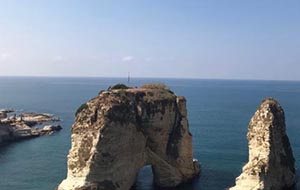 Back in my hostel, I made an unfortunate discovery. The concert I was planning on attending later that night, the opening event of Beirut Pride, was canceled. The website had published an extensive explanation that had much to do with what I had discussed with Pia the day before, with the clerics of Lebanon. The clerics had caught wind of the event through some Facebook groups that claimed the event was for marriage equality, which Beirut Pride was adamant that it was not. This call for marriage equality, a radical proposal in a country that has yet to legalize same-sex relations, caused an uproar amongst the religious community, and sparked a few threats of violence against the venue. The police were then informed of these threats and of the event. Instead of protecting the event or investigating the threats, they instead questioned the venue owner to the nature of the event. The venue owner informed the police that the event had been canceled due to the threats, and then questioned if it was going to take place at a different venue. This back and forth went on until the police made sure that no concert would be taking place, a huge blow to Beirut Pride.
Back in my hostel, I made an unfortunate discovery. The concert I was planning on attending later that night, the opening event of Beirut Pride, was canceled. The website had published an extensive explanation that had much to do with what I had discussed with Pia the day before, with the clerics of Lebanon. The clerics had caught wind of the event through some Facebook groups that claimed the event was for marriage equality, which Beirut Pride was adamant that it was not. This call for marriage equality, a radical proposal in a country that has yet to legalize same-sex relations, caused an uproar amongst the religious community, and sparked a few threats of violence against the venue. The police were then informed of these threats and of the event. Instead of protecting the event or investigating the threats, they instead questioned the venue owner to the nature of the event. The venue owner informed the police that the event had been canceled due to the threats, and then questioned if it was going to take place at a different venue. This back and forth went on until the police made sure that no concert would be taking place, a huge blow to Beirut Pride.
I was in disbelief. I know of course that it was a precarious event and uncertain to happen, but for it to happen a day after hearing about the religious community in Lebanon cracking down so intensely on LGBTQ+ events seemed unreal. The power of these groups to prevent any sort of organization was immense, and with the government and police on the side of the religious conservatives, I wondered for the longevity and future of Beirut Pride as a whole, not just for the other events planned. As I walked, thinking about all of this, I passed some soldiers. I made eye contact with one, and after a bit of a long stare, he cracked a smile at me.
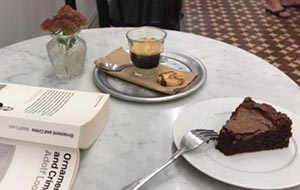 Later, whilst in a yet another coffee shop, a young mother with tattoos and a trendy jumpsuit walked in with her wild child of a son. The boy had long hair and a short attention span, and instantly started to run around the store exploring and climbing anything he could see. Two men sitting and working in the shop, young tech guys clad in graphic tees and flannels, sparked up a conversation with the mother while her son began pleading for a bit of some brownie under a glass bell jar on the counter. The men, while asking the mother about her work and her son, offered a bit of their brownie to the boy. The mother declined their offer firmly, but while the mother was saying no the son cheekily ran up, nabbed a bit of the brownie, and ran off with it. The men burst out laughing while the mother scolded the boy. After receiving high fives from the men, they spoke directly to the boy and began asking him questions: how old he was, what grade he was in, and finally whether or not he had a girlfriend. “No” he responded, “and I’m not gay either”. His mother perked up from her organizing her wallet and turned to look at him sincerely. She said to him, “There’s nothing wrong with being gay.” I smiled.
Later, whilst in a yet another coffee shop, a young mother with tattoos and a trendy jumpsuit walked in with her wild child of a son. The boy had long hair and a short attention span, and instantly started to run around the store exploring and climbing anything he could see. Two men sitting and working in the shop, young tech guys clad in graphic tees and flannels, sparked up a conversation with the mother while her son began pleading for a bit of some brownie under a glass bell jar on the counter. The men, while asking the mother about her work and her son, offered a bit of their brownie to the boy. The mother declined their offer firmly, but while the mother was saying no the son cheekily ran up, nabbed a bit of the brownie, and ran off with it. The men burst out laughing while the mother scolded the boy. After receiving high fives from the men, they spoke directly to the boy and began asking him questions: how old he was, what grade he was in, and finally whether or not he had a girlfriend. “No” he responded, “and I’m not gay either”. His mother perked up from her organizing her wallet and turned to look at him sincerely. She said to him, “There’s nothing wrong with being gay.” I smiled.
29 September
It was an early morning of a long day of travel, with my flight leaving Beirut at 4:30 AM, and my flight landing in Tel Aviv, Israel at 8:30 PM. You cannot fly directly between the two countries, too much conflict and bloodshed to allow for ease of transportation, and so I had a ten-hour layover in Athens, travelling 2,300 kilometers to get to a city that is only 230 kilometers away.
At the airport the Beirut airport there was a consistent ring coming from a flight departing to Moscow. “Sarah Karakova! Last and final boarding call for Sarah Karakova.” Ms. Karakova had nine (I counted) last and final boarding calls, and with each one the urgency in the voice of the flight attendant increased. I imagined Sarah’s life, and the family she was returning to. Was she an important figure, a diplomat perhaps, and that’s why there was such a need for her to be on the flight? Did she live in Moscow? or just nearby, and had even more travel to do after landing? Did she know that she was on her last final boarding call?
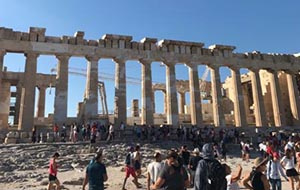 With Karakova’s life racing through my mind, I boarded my flight, and after some dreams of Moscow, I woke up in Athens. With a ten-hour layover and with no desire to get too acquainted with the Athens airport, I decided to venture outside. A train and a subway ride later I was at the Acropolis. The bright white crumbling structures towered over the surrounding city. A concert of tourists replaced the Greeks that roamed this mountain millennia ago; today’s fanny packs replaced the togas of the past. The rocks leading up to the Parthenon were very smooth and slippery, as shoes and hands for thousands of years had grated against any hard facade to create a frictionless surface. They had signs all over prohibiting the taking of any rocks, no matter how small, but how many rocks here have been rubbed away by the stampedes that pass through this mountain every day?
With Karakova’s life racing through my mind, I boarded my flight, and after some dreams of Moscow, I woke up in Athens. With a ten-hour layover and with no desire to get too acquainted with the Athens airport, I decided to venture outside. A train and a subway ride later I was at the Acropolis. The bright white crumbling structures towered over the surrounding city. A concert of tourists replaced the Greeks that roamed this mountain millennia ago; today’s fanny packs replaced the togas of the past. The rocks leading up to the Parthenon were very smooth and slippery, as shoes and hands for thousands of years had grated against any hard facade to create a frictionless surface. They had signs all over prohibiting the taking of any rocks, no matter how small, but how many rocks here have been rubbed away by the stampedes that pass through this mountain every day?
Down the mountain, out of the city, and after my flight, I arrive in Tel Aviv at the eve of Rosh Hashanah, the Jewish New Year. I took a cab to my hostel and was greeted by a slew of 20-somethings celebrating the holiday. Despite the radiating energy coming from the rooftop bar/café, my Jewish New Year resolution was to get a good night’s sleep, so I headed away to my room.
That sleep was interrupted at 3 am when a loud American girl turned on the lights and asked anyone in the room if they wanted to go get a drink with her. Obviously intoxicated, we all groaned, politely conveying that we were all in bed for a reason, but nevertheless she went bunk to bunk to see if we were all sure. When she got to mine, I managed to spit out a “No thank you.” “Are you tired or something?” she asked me. I give her a long, careful look. “A bit.”
30 September
Interesting thing about Israel: the entire country seems to shut down during Jewish holidays. No public transit, most restaurants are closed, and the city streets are empty. It was an eerie morning in Tel Aviv as I searched for an open convenience store, with the roads and sidewalks cleared, windows of businesses shuttered, the only noises coming from the beach, a stray car or two, and the occasional Lime scooter.
After foraging some supplies for the next couple of days at an open 24/7 shop, I traveled to the beach with some friends I had made in the hostel. At the beach, I set up, did the awkward “changing into a swimsuit under a towel” maneuver, and sat in the sand absorbing the sun. The beach was incredible, an deep blue sea with high crashing waves passing on the bright white sand. The entire beachfront was packed with thousands, basking in the sun and enjoying the holiday. When I finally decided to go swimming, I was greeted with warm pristine water, like someone had run a bath to the perfect temperature and all that was missing was me. I stepped out a bit more, the strong high waves washing over my body, and dove into the sea.
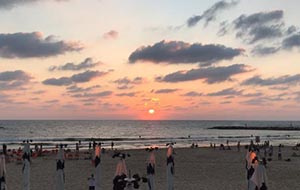 When I emerged, I tasted the salt on my lips and felt it stinging my eyes. As I wiped them clear of water, I looked out into the bright, endless water and realized that this was my first time ever swimming in salt water. Remembering what my Sophomore chemistry teacher Mr. McKendrick had said about the density of salt water vs fresh water, and how it was easier to float in salt water, I laid on my back and floated. Weightless.
When I emerged, I tasted the salt on my lips and felt it stinging my eyes. As I wiped them clear of water, I looked out into the bright, endless water and realized that this was my first time ever swimming in salt water. Remembering what my Sophomore chemistry teacher Mr. McKendrick had said about the density of salt water vs fresh water, and how it was easier to float in salt water, I laid on my back and floated. Weightless.
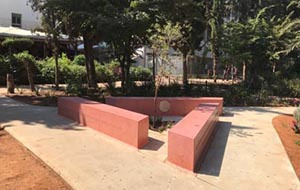 With my first time in the sea under my belt, I made my way towards Meir Park. It was a beautiful compact collection of greenery, with palm trees, large green grass fields, and a playing area for kids. My destination though was a tiny corner of this park. Surrounded by newly bloomed flowers was a simple pink triangle, and on its side in Hebrew, German, and English, denoted that this triangle was dedicated to the victims of the Holocaust persecuted for their sexual and gender identity. It was the first of its kind in Israel, and one of the first worldwide. I felt a sinking feeling approaching it though, as I did not know what to expect.
With my first time in the sea under my belt, I made my way towards Meir Park. It was a beautiful compact collection of greenery, with palm trees, large green grass fields, and a playing area for kids. My destination though was a tiny corner of this park. Surrounded by newly bloomed flowers was a simple pink triangle, and on its side in Hebrew, German, and English, denoted that this triangle was dedicated to the victims of the Holocaust persecuted for their sexual and gender identity. It was the first of its kind in Israel, and one of the first worldwide. I felt a sinking feeling approaching it though, as I did not know what to expect.
A few months back, this very monument, dedicated to men and women who lost their lives based on who they were, was vandalized with “Death to LGBTQ”. It was a one-off act of vandalism and had been promptly cleaned up since. Even though I knew it was unlikely, I was afraid I would discover a similar act and confront the reality that many people in the world want me, and people like me, to not have a space for existence. That event and this monument show, even in a country like Israel – known and praised for their LGBT rights and a place that could build a monument like this – still has many who would deny the humanity of others.
1 October
Today was a day I decided to take easy and have some recovery time. After travelling nonstop for 2 weeks, my body was tired. After battling a cold throughout the 2 weeks, the illness had well and truly caught up with me, making me sluggish and feel ill.
My favorite part about travelling though is how simple chores can be made interesting by being transported to a different country. The washing and wringing of my laundry provided me with energy, the hanging of my clothes to dry a metaphor for the recovery of my health. Cooking rigatoni with a jar of pre-made red sauce was no longer just cooking but creating sustenance to fuel me for the rest of the day. Sleeping was not just sleeping but meditation taken to extreme lengths, a quest to feel truly centered.
With the day off in the sun doing some chores, work, and research, I eagerly looked forward to the remaining few days of my trip and the remaining people I would have the chance to meet.
2 October
Speaking of remaining people, one of them happened to become a parent this day. I woke up to a frantic email from Ohad, a representative of the Aguda, a 14 wide LGBT NGO coalition with headquarters in Tel Aviv, apologetically informing me that his partner had gone into labor and he would unfortunately have to reschedule our meeting today. His consideration was very kind but also struck me as kind of hilarious, that whilst his partner was in labor he still sent me off a quick email telling me he would have to reschedule. With no morning meeting, I got a head start on packing up my clothes, today I would be heading to Jerusalem.
In Jerusalem, I was meeting and staying with two friends that were on holiday there, Ruth and Glyn. Both of them came to Tel Aviv for the day and after checking out of my hostel, taking my luggage to storage, we headed to the beach to spend the day there. Now a saltwater expert, I brought my friends into the warm water, and we marveled at the fact that it was 25 degrees … in October … and we were swimming. The warm sun enveloped us, and the breeze of the day created an atmosphere of total relaxation.
Leaving our sliver of paradise, we explored a bit more of Tel Aviv. We stopped for lunch, and our eyes grew large as our table filled with falafel, hummus, Fatoush, Shakashoush, and lemonade enough to feed a party of ten. The food was filling and rich, each bite like it came from some imaginary Israeli mother concerned that we haven’t been eating enough. When we had certainly quelled our imaginary mother’s concern, we got on our bus and headed to Jerusalem. They recalled stories of their time in Jerusalem during Rosh Hashanah and were envious of the convenience store that I had gone to. Nothing had been open, no one had been around, a ghost town they said. A ghost town I would see soon enough.
3 October
The day began with a return to Lebanon, as I took a call with an admin, who asked to be called Admin Green, for the Facebook page the Lebanese LGBTI Monitor. The page he was an admin for was an aggregator of news that pertained to all things both Lebanese and LGBTQ+ related and would share stories and do outreach for NGOs that serve that community. The page operated under a lot of anonymity, with some of his friends at some NGOs in Lebanon not even knowing that he helps run the page.
He explained a bit more about some of the difficulties in being an admin for the page. One is the infighting that happens within the LGBTQ+ community in Lebanon and how that can sometimes surface on the page. Around the world, there is a lot of disagreement over the best method for activism and the best way for coordination. Lebanon is no exception, and Admin Green shared with me one main disagreement which occurs over Beirut Pride. Admin Green’s, and others’, view, is that Beirut is simply not ready for Pride, and the claim that it has had one (which has been disputed due to events taking place and confusion over whether after-the-fact they were called a part of Beirut Pride) can be damaging to the movement overall. By holding public displays of queerness, the view of many is that this jeopardizes the work of the more professional policy/academic focused activists, and there is no clear answer on what the best route is. On one hand, the visibility can encourage tolerance as people learn to live and see LGBTQ+ people in their day to day lives. On the other hand, visibility could cause crackdowns which would limit the crucial services that LGBTQ+ people in need have access to. It is a point of contention as old as activism itself, and there doesn’t seem to be a resolution in sight.
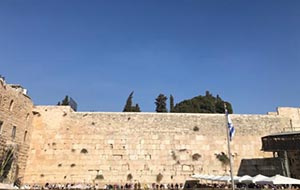 The rest of the day was spent going around Jerusalem where I once again encountered a piousness that I was not familiar with. At the Western Wall in particular, I was struck by the level of devotion of many at the wall, head bowing in silent prayer with their hands pressing against the stones, and much like at the Topkapı palace I felt sorely out of place. Putting on the kippa and walking towards the wall made me feel like I was playing dress-up which in itself made me feel like I was being disrespectful. Obviously, there were other tourists and non-religious people there, but something about it still felt a little wrong. Everyone deserves their own sacred space.
The rest of the day was spent going around Jerusalem where I once again encountered a piousness that I was not familiar with. At the Western Wall in particular, I was struck by the level of devotion of many at the wall, head bowing in silent prayer with their hands pressing against the stones, and much like at the Topkapı palace I felt sorely out of place. Putting on the kippa and walking towards the wall made me feel like I was playing dress-up which in itself made me feel like I was being disrespectful. Obviously, there were other tourists and non-religious people there, but something about it still felt a little wrong. Everyone deserves their own sacred space.
4 October
My last day of the trip started with a coffee and more reading of Google-translated articles about LGBTQ+s in Israel, the usual. As this was Friday, the evening would be the start of the Shabbat and Jerusalem would once again practically shut down, so I also had to secure transportation to the airport bright and early tomorrow morning to head to London.
Before that, though, I headed to my final interview of the trip, with Ben Katz of Shoval. Shoval is a newly independent organization that was created from two organizations advocating for gay men and lesbian women within the Orthodox community. Shoval performs educational outreach in Orthodox schools and trains physiatrists and Rabbis in their understanding of gay issues and creates education for those coming out in that community.
The evolution and progress that the organization has made in recent years is incredible, and he expressed the rapid pace of progress through the focus of their efforts and how they have changed in recent years. Initial reactions to their first degrees of outreach were met with responses denying the existence of gay people within Orthodox communities. Gradually, through increased visibility and hard work by Shoval and likeminded groups, these Orthodox people accepted that gay people exist in their communities, but then began to turn to conversion therapy. Recently, though, conversations on conversion therapy have become less prevalent as people realize the ineffectiveness of such practices, and now more educational and religious leaders are seeking out ways to hold these dialogues and provide services to those in their community that are LGBT.
Ben really stressed the professionalism that he hopes that his organization conveys to these communities. He contends that there is no space for pride events yet in the Orthodox community, and when I used the term LGBTQ+ he corrected me by saying that they only use LGBT. They strive to not overwhelm that community, which of course causes significant conflict with other Queer advocacy organizations within Israel. He was optimistic, though, because of the earnest effort by many in that community to learn how to reach out to and communicate to Queer Orthodox youth. You can live a typical Orthodox life in those communities now for the most part, and are usually welcome at prayer, but that welcome runs out when you attempt to have a traditional family structure with same-sex marriage, as that is still seen as intolerable by leaders.
Recurring divides I’d seen across all the countries I’d visited loomed over me after our meeting. Who is to say the best route to go forward, and what is the most effective way? Is it possible to have a successful movement without these divisive aspects?
The rest of the day was a quiet one, with Jerusalem and all life seemingly coming to a standstill. I walked along the empty ancient streets, contemplating where I had been, all who I’ve met, and all that I’d seen. The silence of a city at rest allowing for reflection of the ever-growing voices I heard of those demanding more.
Conclusion
It was striking throughout the trip how much in-fighting occurs within a movement seeking out one overall goal of equality. Conflict between local activist groups and conflict between groups internationally all stems from an uncertainty about the best route to move forward and best measures to be taken. What muddles this further is a limited access to funding, especially to those organizations that focus more on visibility and communal events, so competition then emerges amongst the organizations to get this limited money. It is easy to see why this can often devolve into fighting and why progress can sometimes seem stalled.
The progress, though, is real and is happening every day. While there may be plenty of setbacks from repressive governments or anti-LGBTQ+ groups, the advocacy groups and networks still remain and continue to grow. Despite in-fighting, every group I spoke to in every country outlined the concerted effort to overcome differences in approaches to have a more coordinated approach and more unified message. Often times this repression can be the catalyst to further cooperation, like in Turkey with Erdoğan’s policies strengthening the underground network amongst activists and helping each other stay safe. The differences are then not weakening the movement, but allowing for innovation and a variety of strategies to take place to see what sticks.
After each of the meetings and interviews I had, I would leave feeling such a surge of energy. The people I’ve met with were so incredibly brave and are risking their lives to help so many people and to change the situation they find themselves in. This trip has really made me reorient what I consider important and worth doing, and has made me want to give back to the LGBTQ+ global community as these activists have done and continue to do.
Also a major takeaway from this trip is my love of Turkey. It was such a beautifully complex nation, full of stunning natural beauty and endless countryside, the massive metropolises of Istanbul and Ankara, and a diverse and friendly people. I am so grateful to have had the opportunity to visit it and it has certainly made me very keen to visit and return to again. My thanks once again to the contributors of the Roger Short Memorial fund and to Victoria Short for this incredible life experience, to see a place I would have never expected I would have seen, and to discover a passion for activism I didn’t know I had.
Find out more about the range of travel grants and scholarships available to assist Univ students on our Travel Grants page or read further travel reports.
Published: 7 January 2020
Explore Univ on social media
